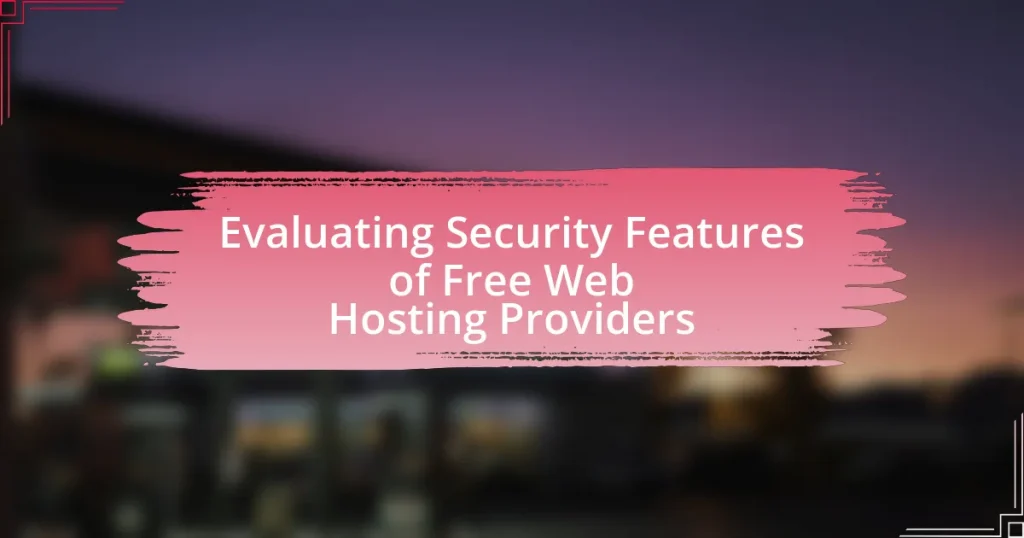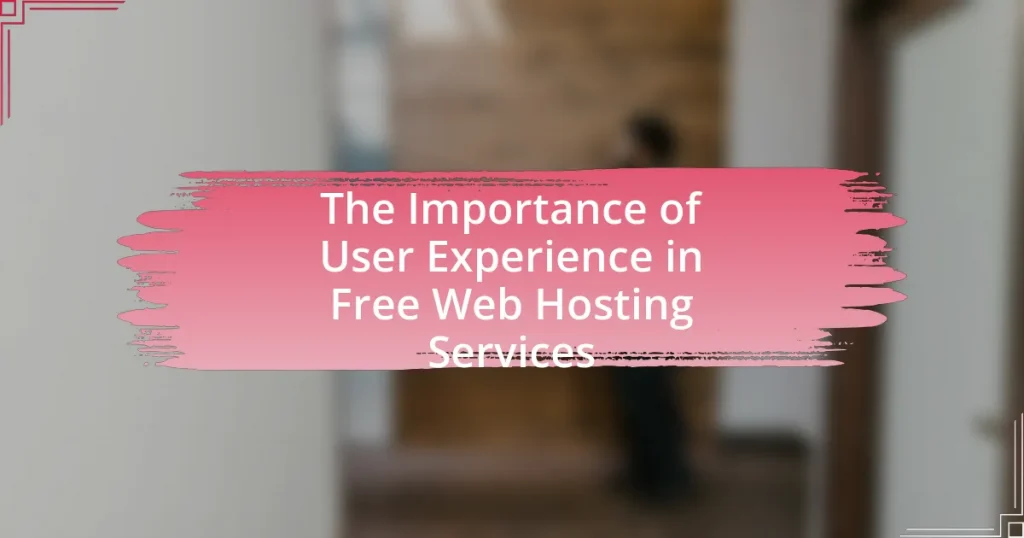The article focuses on evaluating the security features of free web hosting providers, highlighting essential aspects such as SSL certificates, data encryption, regular backups, malware scanning, and DDoS protection. It discusses how these features contribute to data protection and the measures providers take to handle data breaches. Additionally, the article examines user authentication methods, the implications of shared hosting on security, and common cyber threats faced by users of free hosting services. Best practices for users in selecting secure hosting options and enhancing their own security are also outlined, emphasizing the importance of proactive measures in mitigating risks associated with free web hosting.
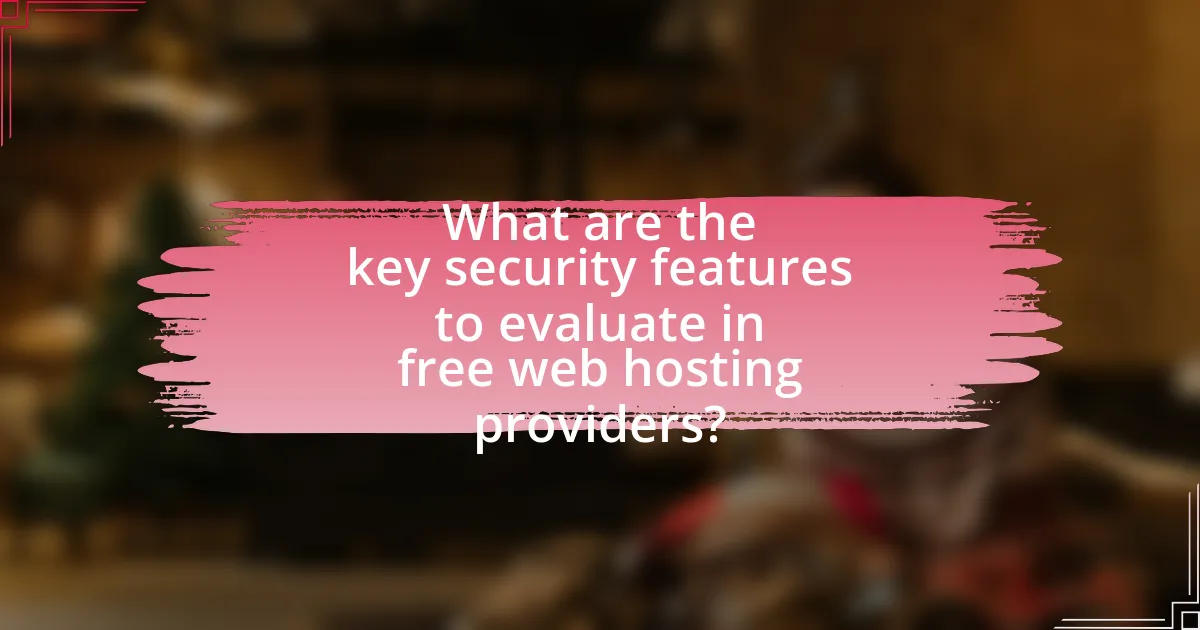
What are the key security features to evaluate in free web hosting providers?
The key security features to evaluate in free web hosting providers include SSL certificates, data encryption, regular backups, malware scanning, and DDoS protection. SSL certificates ensure secure data transmission, while data encryption protects sensitive information stored on servers. Regular backups are crucial for data recovery in case of loss, and malware scanning helps identify and mitigate threats. DDoS protection safeguards against denial-of-service attacks, which can disrupt service availability. These features collectively enhance the security posture of free web hosting services, making them more reliable for users.
How do free web hosting providers ensure data protection?
Free web hosting providers ensure data protection primarily through the implementation of basic security measures such as data encryption, regular backups, and limited access controls. These providers often utilize Secure Socket Layer (SSL) encryption to protect data transmitted between users and servers, safeguarding sensitive information from interception. Additionally, many free hosting services perform regular backups to prevent data loss in case of server failures or cyberattacks, ensuring that users can restore their websites to a previous state. Access controls are also enforced, restricting unauthorized users from accessing sensitive data and server configurations. These practices collectively contribute to a foundational level of data protection, although they may not be as robust as those offered by paid hosting services.
What encryption methods are commonly used by these providers?
Common encryption methods used by free web hosting providers include SSL/TLS (Secure Sockets Layer/Transport Layer Security) and AES (Advanced Encryption Standard). SSL/TLS is widely implemented to secure data transmitted between users and servers, ensuring that sensitive information remains confidential during transfer. AES is often utilized for encrypting stored data, providing a robust level of security with key sizes of 128, 192, or 256 bits. These methods are standard in the industry, as they comply with security protocols and regulations, enhancing the overall security posture of web hosting services.
How do they handle data breaches and incidents?
Free web hosting providers typically handle data breaches and incidents by implementing a structured incident response plan that includes immediate containment, investigation, and notification procedures. They often utilize automated monitoring tools to detect unauthorized access and anomalies in real-time, allowing for swift action to mitigate damage. For example, many providers adhere to industry standards such as the General Data Protection Regulation (GDPR), which mandates that affected users must be notified within 72 hours of a breach. Additionally, they may conduct regular security audits and vulnerability assessments to identify and address potential weaknesses proactively. This approach not only helps in managing incidents effectively but also builds trust with users by demonstrating a commitment to data security.
What role does user authentication play in security?
User authentication is crucial in security as it verifies the identity of users accessing a system, ensuring that only authorized individuals can gain access to sensitive information and resources. This process typically involves the use of credentials, such as usernames and passwords, biometric data, or multi-factor authentication methods, which significantly reduce the risk of unauthorized access. According to a report by Verizon, 81% of data breaches are linked to weak or stolen passwords, highlighting the importance of robust user authentication mechanisms in protecting against such threats.
What types of authentication methods are implemented?
Free web hosting providers typically implement several types of authentication methods, including username and password combinations, two-factor authentication (2FA), and single sign-on (SSO). Username and password authentication is the most common method, requiring users to enter a unique identifier and a secret passphrase. Two-factor authentication enhances security by requiring a second form of verification, such as a code sent to a mobile device. Single sign-on allows users to access multiple services with one set of credentials, streamlining the login process while maintaining security. These methods are essential for protecting user accounts and sensitive data from unauthorized access.
How can users enhance their own security on these platforms?
Users can enhance their own security on free web hosting platforms by implementing strong, unique passwords and enabling two-factor authentication (2FA). Strong passwords reduce the risk of unauthorized access, while 2FA adds an additional layer of security by requiring a second form of verification, such as a text message or authentication app. According to a study by Google, enabling 2FA can block 100% of automated bots and 96% of bulk phishing attacks, significantly improving account security.
What are the implications of shared hosting on security?
Shared hosting significantly impacts security due to the inherent risks of multiple users sharing the same server resources. This environment increases vulnerability to attacks, as a security breach in one account can potentially compromise others on the same server. For instance, if one website experiences a Distributed Denial of Service (DDoS) attack, it can affect the performance and availability of all sites hosted on that server. Additionally, shared hosting often lacks robust security measures, such as dedicated firewalls and intrusion detection systems, which are more common in dedicated hosting environments. According to a study by the Ponemon Institute, 60% of small businesses that experience a cyber attack go out of business within six months, highlighting the critical need for enhanced security in shared hosting scenarios.
How does shared hosting affect website vulnerability?
Shared hosting increases website vulnerability due to multiple websites sharing the same server resources, which can lead to security risks. When one website on a shared server is compromised, attackers can exploit vulnerabilities to access other sites on the same server, as they often share the same IP address and resources. According to a study by the University of California, Berkeley, shared hosting environments are more susceptible to cross-site scripting (XSS) and cross-site request forgery (CSRF) attacks, as the isolation between websites is minimal. This lack of isolation means that a security breach in one site can potentially affect all other sites hosted on the same server, making shared hosting a less secure option for sensitive or high-traffic websites.
What measures do providers take to mitigate risks in shared environments?
Providers implement several measures to mitigate risks in shared environments, including resource isolation, access controls, and regular security audits. Resource isolation ensures that users’ data and applications do not interfere with one another, reducing the risk of data breaches. Access controls limit user permissions, ensuring that only authorized individuals can access sensitive information. Regular security audits help identify vulnerabilities and ensure compliance with security standards, thereby enhancing the overall security posture of the shared environment. These measures collectively contribute to a safer hosting experience for users.
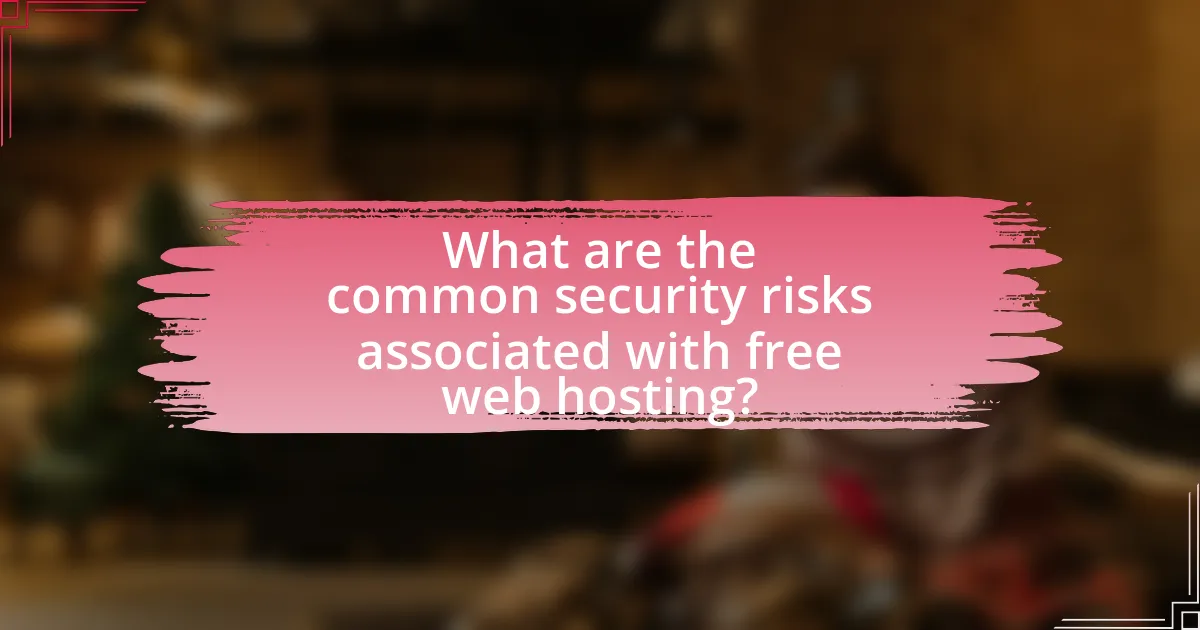
What are the common security risks associated with free web hosting?
Common security risks associated with free web hosting include limited security measures, lack of data encryption, and vulnerability to malware and hacking. Free web hosting services often do not provide robust security protocols, making websites susceptible to attacks. For instance, a study by the University of Maryland found that websites hosted on free platforms are 50% more likely to be compromised compared to those on paid services. Additionally, free hosting providers may not offer regular software updates or security patches, further increasing the risk of exploitation.
What types of cyber threats are prevalent in free web hosting environments?
Free web hosting environments are particularly vulnerable to several types of cyber threats, including malware distribution, data breaches, and phishing attacks. These threats arise due to the lack of robust security measures typically found in paid hosting services. For instance, malware can be easily injected into websites hosted on free platforms, as these services often do not implement stringent security protocols. Additionally, data breaches are common because free hosting providers may not adequately protect user data, leading to unauthorized access. Phishing attacks also proliferate in these environments, as attackers exploit the trust users place in free hosting services to trick them into revealing sensitive information.
How do malware and phishing attacks target free hosting users?
Malware and phishing attacks target free hosting users primarily by exploiting the lack of robust security measures typically associated with free services. Free hosting providers often have limited resources to implement advanced security protocols, making their users more vulnerable to attacks. For instance, attackers may inject malicious code into websites hosted on these platforms, leveraging vulnerabilities in outdated software or weak configurations. Additionally, phishing schemes can impersonate legitimate free hosting services to trick users into providing sensitive information, such as login credentials. According to a report by the Anti-Phishing Working Group, phishing attacks have increased significantly, with many targeting users of free services due to their perceived lower security standards.
What are the risks of using outdated software on these platforms?
Using outdated software on free web hosting platforms significantly increases the risk of security vulnerabilities. These vulnerabilities can be exploited by cybercriminals to gain unauthorized access to sensitive data, leading to data breaches. For instance, a report by the Ponemon Institute found that 60% of companies experienced a data breach due to unpatched software vulnerabilities. Additionally, outdated software often lacks the latest security updates and patches, making it an easy target for malware and ransomware attacks. The National Cyber Security Centre has also highlighted that outdated software can lead to compliance issues, as organizations may fail to meet regulatory requirements for data protection.
How can users identify potential security weaknesses?
Users can identify potential security weaknesses by conducting thorough assessments of their web hosting environment. This includes reviewing security features such as SSL certificates, firewalls, and data encryption methods provided by the hosting service. Additionally, users should perform regular vulnerability scans and penetration testing to uncover exploitable flaws. According to a study by the Ponemon Institute, 60% of organizations experienced a data breach due to unpatched vulnerabilities, highlighting the importance of proactive security evaluations. By staying informed about the latest security threats and implementing best practices, users can effectively identify and mitigate potential weaknesses in their web hosting security.
What signs indicate a lack of security in a free hosting provider?
Signs indicating a lack of security in a free hosting provider include the absence of SSL certificates, weak password policies, and limited customer support. Free hosting providers often do not implement SSL, which encrypts data between the user and the server, making it vulnerable to interception. Additionally, if a provider allows weak passwords or does not enforce regular password changes, it increases the risk of unauthorized access. Furthermore, inadequate customer support can signal a lack of commitment to security, as timely assistance is crucial during security incidents. These factors collectively suggest that a free hosting provider may not prioritize user security effectively.
How can users assess the security policies of a provider?
Users can assess the security policies of a provider by reviewing the provider’s documentation, which typically includes details on data protection measures, encryption standards, and compliance with regulations such as GDPR or HIPAA. Additionally, users should examine third-party audits or certifications that validate the provider’s security practices, such as ISO 27001 or SOC 2 compliance. Furthermore, analyzing user reviews and feedback can provide insights into the provider’s security performance and incident response history.
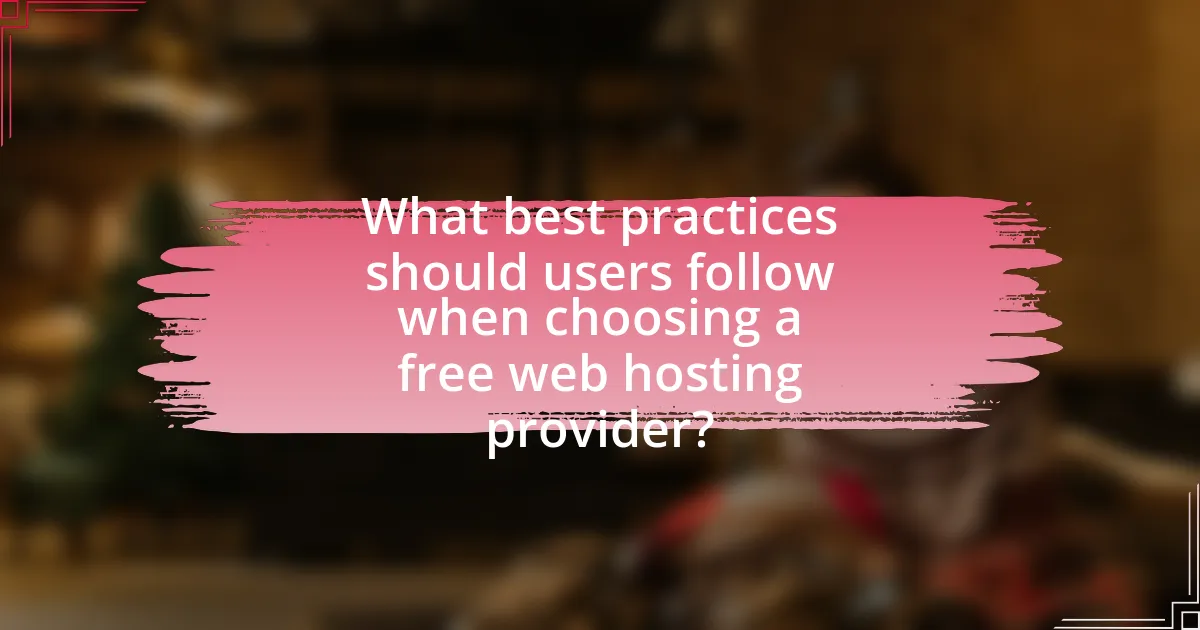
What best practices should users follow when choosing a free web hosting provider?
Users should prioritize security features when choosing a free web hosting provider. This includes verifying that the provider offers SSL certificates, which encrypt data transmitted between the user and the website, ensuring secure connections. Additionally, users should check for regular backups, as these protect against data loss due to breaches or server failures. It is also essential to assess the provider’s security protocols, such as firewalls and malware scanning, which help prevent unauthorized access and attacks. Furthermore, users should read reviews and research the provider’s reputation regarding security incidents, as a history of breaches may indicate inadequate security measures.
How can users evaluate the security features of different providers?
Users can evaluate the security features of different providers by examining their security protocols, data encryption methods, and compliance with industry standards. Specifically, users should look for features such as SSL certificates, firewalls, DDoS protection, and regular security audits. For instance, providers that comply with standards like ISO 27001 or GDPR demonstrate a commitment to data security and privacy. Additionally, user reviews and third-party security assessments can provide insights into the effectiveness of a provider’s security measures.
What specific questions should users ask potential providers?
Users should ask potential providers about their security measures, including data encryption, backup protocols, and incident response plans. Specifically, users should inquire if the provider offers SSL certificates for secure data transmission, how often backups are performed and stored, and what steps are taken in the event of a security breach. These questions are crucial as they directly relate to the protection of user data and the overall reliability of the hosting service. For instance, a study by the Ponemon Institute found that 60% of small businesses that experience a data breach go out of business within six months, highlighting the importance of robust security features in web hosting.
How can user reviews and ratings inform security evaluations?
User reviews and ratings can significantly inform security evaluations by providing real-world insights into the experiences of users with specific web hosting providers. These reviews often highlight vulnerabilities, security breaches, and the effectiveness of customer support in addressing security issues. For instance, a study by the Ponemon Institute found that 60% of users reported security incidents that were not disclosed by the provider, indicating that user feedback can reveal critical security gaps. Additionally, high ratings may correlate with robust security measures, while negative reviews can signal potential risks, allowing prospective users to make informed decisions based on collective user experiences.
What steps can users take to enhance their security on free hosting platforms?
Users can enhance their security on free hosting platforms by implementing strong passwords, enabling two-factor authentication, regularly updating software, and utilizing secure connections. Strong passwords reduce the risk of unauthorized access, while two-factor authentication adds an extra layer of security by requiring a second form of verification. Regular software updates patch vulnerabilities that could be exploited by attackers. Additionally, using secure connections, such as HTTPS, protects data transmitted between the user and the hosting platform, safeguarding against interception. These steps collectively mitigate risks associated with free hosting environments, which often lack robust security measures.
How can regular updates and backups improve security?
Regular updates and backups significantly enhance security by ensuring that software vulnerabilities are patched and data is recoverable in case of breaches. Updates often include security patches that address known vulnerabilities, reducing the risk of exploitation by cybercriminals. For instance, a study by the Ponemon Institute found that organizations that regularly update their systems experience 50% fewer security incidents compared to those that do not. Backups provide a safety net, allowing organizations to restore data to a previous state after a ransomware attack or data loss incident, thereby minimizing downtime and data loss. This dual approach of maintaining current software and having reliable data recovery options is essential for robust security in web hosting environments.
What additional security tools can users implement?
Users can implement additional security tools such as firewalls, antivirus software, and intrusion detection systems. Firewalls help monitor and control incoming and outgoing network traffic based on predetermined security rules, effectively blocking unauthorized access. Antivirus software scans for and removes malicious software, protecting systems from viruses and malware. Intrusion detection systems monitor network traffic for suspicious activity and potential threats, providing alerts for any detected breaches. These tools collectively enhance the security posture of users utilizing free web hosting providers, which may have limited built-in security features.
What are the key takeaways for ensuring security with free web hosting?
To ensure security with free web hosting, users should prioritize selecting providers that offer robust security features such as SSL certificates, regular backups, and malware scanning. These features help protect sensitive data and maintain website integrity. Additionally, users must implement strong passwords and enable two-factor authentication to further safeguard their accounts. Research indicates that websites with SSL certificates experience a 50% reduction in the risk of data breaches, highlighting the importance of this feature. Regularly updating software and plugins is also crucial, as outdated systems are more vulnerable to attacks. By focusing on these key areas, users can significantly enhance the security of their free web hosting services.










